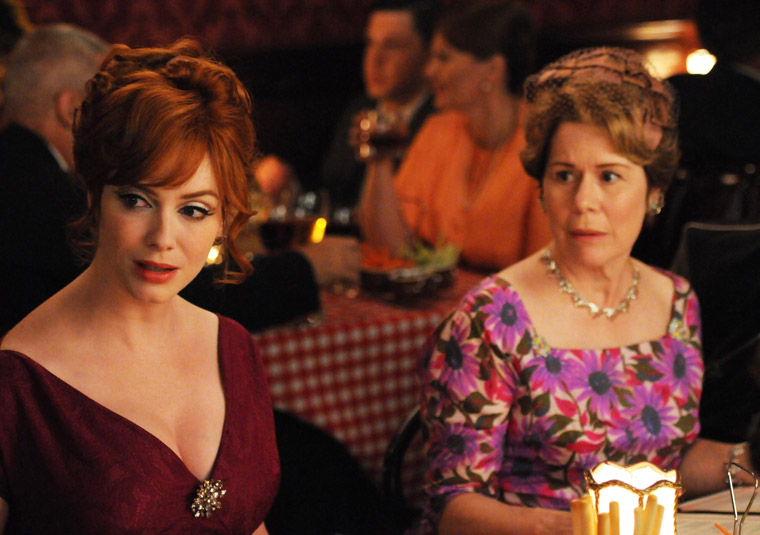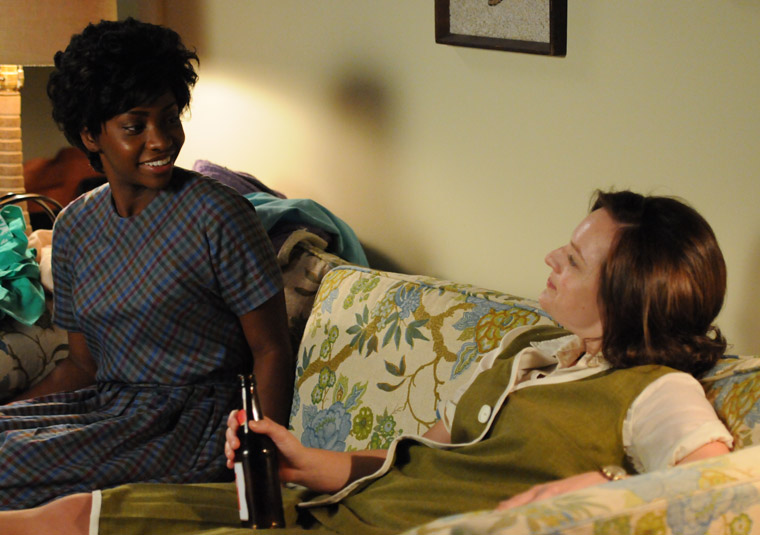The women take centre stage in this week’s installment of Mad Men with an episode that explores many complex issues with regard social constructions, as well as delving into some downright dark issues.
Let’s take a closer look after the jump.
Rather than focus on the darker elements explored in last night’s episode, I have to start with what I thought was an extremely satisfying and triumphant development: how Joan (Christina Hendricks) finally kicked her pretty-boy husband Greg (Sam Page) to the curb. It’s revealed that after a full year in Vietnam, Greg has to go back and serve for another one rather than stay at home with Joan and newborn baby Kevin. What he doesn’t reveal to her initially is that he’s actually volunteered to go back. Refusing to “stroke his ego” and put her life on hold as a result, she tells him (after a sleepless night) to never come back. Adding insult to injury she very clearly tells him that he is far from the “good man” he’s projecting, referring to when he raped her a couple seasons back.
This was a long time coming. Once Joan defiantly called him on his BS, I felt like I was finally able to breathe after being suffocated by their stifling facade of the happy nuclear family. Let’s keep in mind that Greg was only back for this episode, but Joan’s devotion to their marriage has been going on for quite some time. To quote her mother: “You don’t know how truly tired you are.”
Considering the climate of 1966 and the role of women, this was an extremely progressive action. Nor was it out of the blue or hastily tacked on – her decision comes after a logical sequence of events that reveal Joan’s rightful place as a feminist role model. True to Mad Men form, even though we see these events unfolding in the 60s (a time long since passed), the motivations remain relevant today. How many 2012 women continually feel pressure to get married, pump out kids and be the dutiful wife? We may have reached a stage where women’s choices (Read: married or not) are embraced with more understanding, but at the core, unhappiness is universal. It takes tremendous courage for a woman to know when she’s unhappy even if the outside looks picture perfect. When Joan finally realizes that Greg is a no-good douchebag – although it is difficult going alone as a single mother- it is something we can all celebrate in any era. Let’s not forget the little cherry on the sundae in our last shot: Joan in the bed with her baby and her mother, wearing the pants. I also appreciated the trepidation in her face because just like life, it might be the right decision, but it is not necessarily the easiest.
Which brings me to another female character who is slowly starting to wear the “pants” herself: Peggy (Elisabeth Moss). She’s cements her position as ‘one of the guys’ when she relishes in sucking $400 (no small chump change by 1966 standards) out of Roger (John Slattery) when he asks her to work all weekend on a campaign for Mohawk. He was too busy manifesting Pete’s (Vincent Kartheiser) prediction about Roger’s redundancy by sleeping in his office (literally) rather than getting writer Ginsberg (Ben Feldman) on it ahead of time.
It was nice exchange between Peggy and Roger as he threatened to fire her if she didn’t do as he said. Unable to successfully wield his power, Peggy simply calls out his empty threats. This is a very different Peggy from the one we were introduced to in the first season. But Peggy’s smugness is undercut by the darker undertones I alluded to earlier. We hear about the tragic and horrific Chicago massacre of eight nursing students murdered by Richard Speck early in the episode. Peggy indeed triumphs over Roger but that means that she has to stay in the office alone late into the night. After she hears a sound, we go into full-on suspense mode as she calls out “Hello? Who’s there?” in the darkness. The murders that we heard about in the periphery insidiously inform our expectations as Peggy explores the abandoned office. Thankfully there are no murderers lurking after hours at SCDP, just poor Dawn (Teyonah Parris) who has to sleep at the office because it’s far too unsafe for her to head home after a certain hour.
Which brings me another interesting point. With all this talk about women breaking down gender constructions, how does race fare in this space? Understanding Dawn’s precarious situation, Peggy offers her apartment as a safe haven. They have a heart-to-heart and a drunk Peggy pats herself on the back for keeping the sisterhood together. But not all women suffer the same injustices, as we soon see. Peggy is deflated when she learns that Dawn has no interest in becoming a copywriter. Furthermore, Peggy’s ambivalent racism is disappointing to both herself and Dawn when Peggy has to pause about leaving her purse full of Roger’s money in the same room as Dawn for the night. Nothing is said, but the subtle exchange of glances speaks volumes.
Of course, there’s even more to be said about how the Chicago Massacre is a further through-line in the rest of the episode, particularly with regard to Sally (Kiernan Shipka) and her interaction with grandmother in-law, Pauline (Pamela Dunlap). Even more connections? Ginsberg’s pitch about the dark Cinderella myth and its further implications regarding violence against women. For the sake of brevity, I’ll refer you to the thoughtful interpretations of Mo Ryan over on Huff Post and Adam B. Vary for EW.
I don’t think, however, that I can neglect the significance of Don’s (Jon Hamm) flu-induced hallucination murder – one of the darkest moments of last night’s episode. After meeting one of his past conquests, Andrea (Mädchen Amick), on the way to SCDP with Megan (Jessica Paré), Don wrestles (again) with the temptation of infidelity. Although his marriage to Megan is decidedly different than what we saw with Betty (January Jones), the Andrea scenes suggest that his propensity to cheat isn’t something that can be easily brushed aside. Kudos to Megan for bringing this to Don’s attention. She continues to surprise me this season by breaking the pretty-face stereotype.
Of course we’re shown this explicitly when Andrea shows up at his front door looking for some quick sex. The thrill of getting caught is what appears to push Don to action, even if only turns out to be a dream sequence. It’s unclear whether or not Andrea’s initial appearance actually happened, but her eventual murder is clearly a fantasy. Why this scene is particularly shocking, despite the fact that it is “not really happening” is because we normally don’t see these overtly dark desires played out and staged for us. Normally they’re implied or brewing beneath the surface. After taunting him about how cheating is a “mistake he loves making” (truly superb writing by the way), Andrea is choked to death by Don, who then clumsily pushes her body under the bed.
The Cinderella myth Ginsberg spoke about before is explicitly symbolized by Andrea’s leg (and shoe) poking out from beneath the bed. This is how the lone survivor of the Chicago Massacre managed to escape from being murdered: she hid under the bed. There are multiple layers of symbolism going on here.
Let’s start with Don and his gender norms: Is he fighting the fact that men are expected to cheat? That it is in their nature to go around spreading their seed? Does he literally want to kill the temptation, or is he only hiding it beneath the surface, forever poking out from under his bed? What does this Don – the sweaty, disheveled and naked man – the one who doesn’t have the guise of ‘the handsome man’ (read: Prince Charming) anymore tell us about his true nature? There’s so much to analyze and dissect here. There’s more to this imaginary murder than simply shoving it under the bed.
This is why Don goes back to sleep after haphazardly disposing of his temptation and why everything seems to be wrapped up in a nice little package as Megan appears in the morning, framed by sunshine and offering orange juice. We just had a huge revelation and we can comfort ourselves by saying “oh, it was just a dream” – but like Don’s confusion, we know the darkness still exists and will likely reappear. But for now, the evidence is still clumsily stashed under the bed, waiting to be discovered.
So while I continue to ponder about the multiple layers of this episode, what did you think viewers? What are some of your interpretations? Is Don definitely going to cheat? Do you think Andrea really showed up as his door? Is she destined to reappear either in Don’s dreams or at his office? How do you think Joan will fare now that’s she’s on her own? Think she’ll go running into the arms of her babydaddy, Roger? Don’t be shy now – sound off in our comments section.
Mad Men airs Sundays at 10:00pm EST on AMC


Great recap! Mystery Date has been one of my favorite Mad Men episodes so far (and considering everyone episode is pretty good – that is saying a lot). So much girl power! Joan, Peggy, Megan (I have also been so impressed by her this season!), Sally…
I couldn’t help but feel so proud of Joan when she finally told off Greg, that I literally wanted to reach inside the TV and just hug her. It was always so tough for me watching the almighty Joan getting walked all over by that selfish asshole. That scene at the kitchen table where she finally tells him off was chilling. Christina Hendricks pulled out all her acting chops for that one! I had goosebumps.
Agreed! The women were really shining in this episode! And so surprising too considering the time period. It’s lovely to see such layered performances by all the actresses – I love the subtlety and ambiguity – but I also love it when they come out guns blazing like Christina Hendricks did this week!